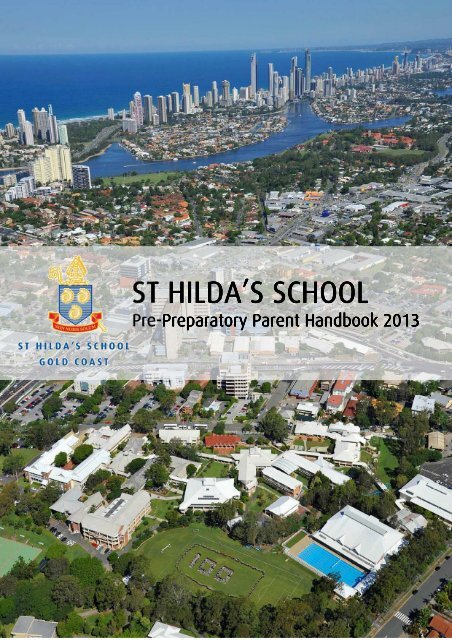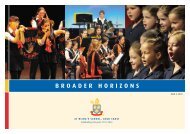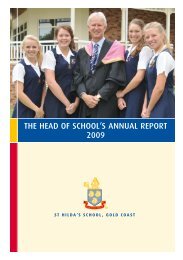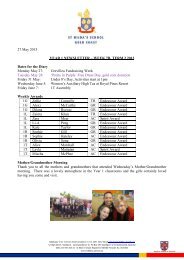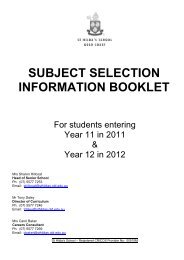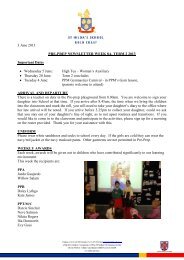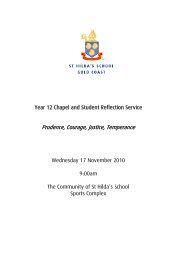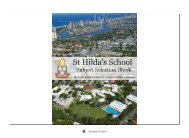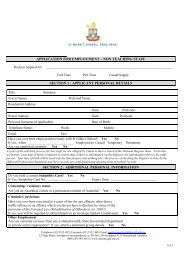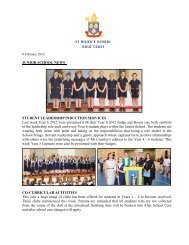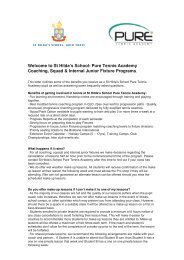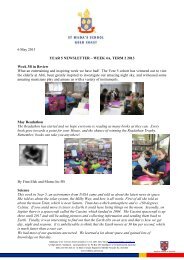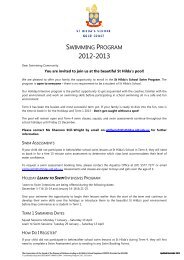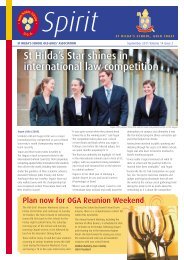Pre Prep Parent Handbook 2013 v9 - 31 January ... - St Hildas School
Pre Prep Parent Handbook 2013 v9 - 31 January ... - St Hildas School
Pre Prep Parent Handbook 2013 v9 - 31 January ... - St Hildas School
Create successful ePaper yourself
Turn your PDF publications into a flip-book with our unique Google optimized e-Paper software.
ST HILDA’S SCHOOL<br />
<strong>Pre</strong>-<strong>Pre</strong>paratory <strong>Pre</strong>paratory <strong>Parent</strong> <strong>Handbook</strong> <strong>2013</strong>
Table of Contents<br />
TEACHERS AND PARENTS IN PARTNERSHIP ................................................................................................................... 4<br />
SCHOOL ADMINISTRATIVE STRUCTURE ........................................................................................................................... 6<br />
PRE-PREPARATORY SCHOOL STAFF ................................................................................................................................... 6<br />
STAFF POLICY ............................................................................................................................................................................. 7<br />
CLASS SIZE/ AGE ....................................................................................................................................................................... 7<br />
PRE-PREPARATORY PHILOSOPHY ....................................................................................................................................... 7<br />
GENERAL AIMS OF THE PRE-PREPARATORY YEAR ........................................................................................................ 8<br />
AIMS FOR CHILDREN ............................................................................................................................................................... 8<br />
SPECIFIC GOALS OF THE PRE-PREPARATORY PROGRAM ........................................................................................... 9<br />
THE PROGRAM .......................................................................................................................................................................... 9<br />
PRE-LITERACY ..........................................................................................................................................................................11<br />
PRE-NUMERACY......................................................................................................................................................................12<br />
PROJECT WORK .......................................................................................................................................................................12<br />
BENEFITS OF PLAY ..................................................................................................................................................................12<br />
HOW ARE PROGRAMS DEVELOPED? ...............................................................................................................................13<br />
MORNING MAT TIME ............................................................................................................................................................13<br />
DAILY POWERPOINT PRESENTATION AND SHARED JOURNAL ..............................................................................13<br />
BLACKBOARD ...........................................................................................................................................................................13<br />
STUDENT HANDBOOK AND PLANNER............................................................................................................................13<br />
PRE-PREPARATORY WEEKLY NEWSLETTERS ..................................................................................................................14<br />
ST HILDA’S NEWSLETTER .....................................................................................................................................................14<br />
DOCUMENTATION .................................................................................................................................................................14<br />
PROTECTION OF PRIVACY ...................................................................................................................................................14<br />
PORTFOLIOS .............................................................................................................................................................................14<br />
PARENTAL INVOLVEMENT POLICY ...................................................................................................................................14<br />
PARENT ROSTER .....................................................................................................................................................................15<br />
VOLUNTEERS ............................................................................................................................................................................15<br />
CHILD CARE STUDENTS/SCHOOL BASED TRAINEES PARTICIPATION POLICY ....................................................15<br />
ANTI-BIAS MULTICULTURAL PROGRAM POLICY ..........................................................................................................15<br />
COMPLAINTS/CONCERNS ...................................................................................................................................................16<br />
CHILD CARE BENEFIT & CHILD CARE REBATE ...............................................................................................................16<br />
ORIENTATION AND INDUCTION .......................................................................................................................................17<br />
PRE-PREPARATORY SCHOOL CALENDAR <strong>2013</strong> ............................................................................................................17<br />
HEALTH AND HYGIENE POLICY ..........................................................................................................................................17<br />
FIRE AND EVACUATION PROCEDURES ............................................................................................................................18<br />
<strong>Pre</strong>-<strong>Pre</strong>paratory <strong>Pre</strong>paratory <strong>Handbook</strong> <strong>2013</strong><br />
Page 2<br />
The Corporation of the Synod of the Diocese of Brisbane trading as <strong>St</strong> Hilda’s <strong>School</strong> Registered CRICOS Provider No 00510M<br />
Audrey Fellowes – 30 <strong>January</strong> <strong>2013</strong>
SUSPECTED CHILD ABUSE OR NEGLECT POLICY ..........................................................................................................19<br />
SAFETY POLICY ON ARRIVALS AND DEPARTURES ......................................................................................................19<br />
BIRTHDAYS ...............................................................................................................................................................................19<br />
FOOD AND NUTRITION POLICY ........................................................................................................................................20<br />
LUNCH .......................................................................................................................................................................................20<br />
EXCURSION POLICY ...............................................................................................................................................................20<br />
BEHAVIOUR POLICY ...............................................................................................................................................................20<br />
TREASURES FROM HOME ....................................................................................................................................................20<br />
UNIFORM AND SUN PROTECTION POLICY ....................................................................................................................21<br />
APPENDIX 1 – Immunisation Details .................................................................................................................................22<br />
APPENDIX 2 – Minimum Periods of Exclusion from <strong>Pre</strong>-school Settings ..............................................................23<br />
APPENDIX 3 – Operating Hours <strong>2013</strong> ..............................................................................................................................25<br />
APPENDIX 4 – <strong>2013</strong> Term Dates .........................................................................................................................................26<br />
APPENDIX 5 – <strong>Pre</strong>-<strong>Pre</strong>p M Attendance Dates <strong>2013</strong> .....................................................................................................27<br />
APPENDIX 6 – <strong>Pre</strong>-<strong>Pre</strong>p T Attendance Dates <strong>2013</strong> .......................................................................................................28<br />
<strong>Pre</strong>-<strong>Pre</strong>paratory <strong>Pre</strong>paratory <strong>Handbook</strong> <strong>2013</strong><br />
Page 3<br />
The Corporation of the Synod of the Diocese of Brisbane trading as <strong>St</strong> Hilda’s <strong>School</strong> Registered CRICOS Provider No 00510M<br />
Audrey Fellowes – 30 <strong>January</strong> <strong>2013</strong>
TEACHERS AND PARENTS IN PARTNERSHIP<br />
Success in an early childhood setting is a<br />
goal that both parents and teachers require<br />
for their children. This goal can be more<br />
easily achieved when parents and teachers<br />
work together.<br />
Learning improves when parents are<br />
involved in their child's education. When<br />
parents work in partnership with their child's<br />
teacher, the child clearly benefits.<br />
The <strong>Pre</strong>-<strong>Pre</strong>paratory Program offered by <strong>St</strong> Hilda’s <strong>School</strong> aims<br />
to ensure that the children in our care develop self-confidence,<br />
independence, skills in body use, organisation of thinking and<br />
the ability to work and communicate with others.<br />
<strong>Parent</strong>s and teachers are regarded as equal partners in the<br />
Program and as such parents are welcome to participate in the<br />
<strong>School</strong>’s daily activities.<br />
So how can teachers and parents work in partnership?<br />
There are many things parents can do at home. Encouraging a positive attitude towards learning provides the<br />
child with the necessary foundation for success. Teachers appreciate it when parents:<br />
• Help their children understand that learning is important.<br />
• <strong>St</strong>ress good work habits.<br />
• Set expectations for learning, taking into account the child's ability.<br />
• Show interest in what their child is learning and shared activities occurring within the classroom.<br />
• Understand their children are learning through play.<br />
• Read the memos and information sheets emailed home and note important dates on the calendar.<br />
It is important that teachers and parents get to know each other and develop trust and respect for each other.<br />
Children succeed when there is an open exchange of information that links home and school.<br />
• Exchange ideas about the child's special talents and hobbies to help focus the child's learning through<br />
interest, strengths and weaknesses.<br />
• Inform the teacher if the child has any medical condition that may affect the child at school - asthma,<br />
allergies or diabetes, or any other conditions such as limited hearing, speech, gross/fine motor skills that<br />
may impact on the child’s learning. Teachers are not medical practitioners, and parents should discuss<br />
arrangements they have made for emergency situations.<br />
• Talk with the child's teacher about what is being taught.<br />
• Discuss classroom expectations, and discipline. Explore ways that the parent and teacher can help the<br />
children meet those standards and needs.<br />
• Advise the teacher of situations which might affect the child's interest, for example, a seriously ill<br />
grandparent, the arrival of a baby, or changes in a work situation can be upsetting to a child. Teachers are<br />
better able to provide learning experiences for children if parents let teachers know what is happening.<br />
<strong>Pre</strong>-<strong>Pre</strong>paratory <strong>Pre</strong>paratory <strong>Handbook</strong> <strong>2013</strong><br />
Page 4<br />
The Corporation of the Synod of the Diocese of Brisbane trading as <strong>St</strong> Hilda’s <strong>School</strong> Registered CRICOS Provider No 00510M<br />
Audrey Fellowes – 30 <strong>January</strong> <strong>2013</strong>
How do parent-teacher interviews fit into the whole process?<br />
The partnership between parents and teachers often develops in informal ways - an orientation prior to the start<br />
of the year, a phone call, notes in diaries and newsletters to keep in touch. Teachers welcome frequent contact<br />
from parents. Problems can often be avoided by early and frequent communication.<br />
<strong>Parent</strong>-teacher interviews offer a more formal time for parents and teachers to talk about and define their roles<br />
and responsibilities in a child's education. Reports are also sent home at the end of each semester so that<br />
achievements and concerns can be highlighted.<br />
Since each child is different, each parent-teacher interview will reflect that individuality. However, the following<br />
matters are often discussed:<br />
• All areas of development of the child - samples of work in portfolio shown;<br />
• The parents' and teacher's expectations for the child;<br />
• How the teacher evaluates progress;<br />
• Joys and problems related to the child;<br />
• Joint development of a plan to help the child overcome any problems and to continue important<br />
accomplishments; and<br />
• How parents and teachers can work together on a continuing basis to encourage the child to do well.<br />
What do we do if a problem arises?<br />
Children at times are confronted with challenging situations,<br />
communication is vital to solving these problems.<br />
When a parent has a concern, the first person to talk with is<br />
always the teacher. This is a matter of protocol and a school<br />
policy called the grievance policy, as well as courtesy. In<br />
almost all cases, parents and teachers can find a solution<br />
together.<br />
If, for some reason, parents and teachers are not able to<br />
resolve the problem, it may be helpful to have a joint<br />
meeting with the Director and maybe even the Head of<br />
Junior <strong>School</strong>. However, such action is not always necessary<br />
- especially if parents and teachers are committed to<br />
working together.<br />
And when good things happen?<br />
Tell each other! Compliments reinforce the good things that are happening in the child's life either at home or at<br />
the centre.<br />
Keeping in touch and working together is the best way to ensure a high quality education for our children, and to<br />
help ensure their success not only at school, but also in life.<br />
<strong>Pre</strong>-<strong>Pre</strong>paratory <strong>Pre</strong>paratory <strong>Handbook</strong> <strong>2013</strong><br />
Page 5<br />
The Corporation of the Synod of the Diocese of Brisbane trading as <strong>St</strong> Hilda’s <strong>School</strong> Registered CRICOS Provider No 00510M<br />
Audrey Fellowes – 30 <strong>January</strong> <strong>2013</strong>
SCHOOL ADMINISTRATIVE STRUCTURE<br />
Head of <strong>School</strong>:<br />
Head of Junior <strong>School</strong>:<br />
Head of Administration:<br />
Mr Peter Crawley<br />
Telephone: (07) 5577 7205<br />
Email: principal@sthildas.qld.edu.au<br />
Mrs Lisa Cleverly<br />
Telephone: (07) 5577 7287<br />
Email: lcleverly@sthildas.qld.edu.au<br />
Mrs Melissa Wilkins<br />
Telephone: (07) 5577 7237<br />
Email: mwilkins@sthildas.qld.edu.au<br />
Director of <strong>Pre</strong>-<strong>Pre</strong>paratory &<br />
Mrs Audrey Fellowes<br />
Director Out of <strong>School</strong> Hours Care (OSHC) Telephone: 5577 7295<br />
Email: afellowes@sthildas.qld.edu.au<br />
<strong>Pre</strong>-<strong>Pre</strong>paratory – Year 2 Curriculum Coordinator<br />
Year 3 – Year 6 Curriculum Coordinator<br />
Administration Assistant<br />
Ms. Cathryn Gittins<br />
Telephone: (07) 5577 7286<br />
Email: cgittins@sthildas.qld.edu.au<br />
Mrs Sarah Yates<br />
Telephone: (07) 5577 7286<br />
Email: syates@sthildas.qld.edu.au<br />
Ms Kym Rankin<br />
Telephone: (07) 5577 7230<br />
Email: krankin@sthildas.qld.edu.au<br />
PRE-PREPARATORY SCHOOL STAFF<br />
Director/Teacher:<br />
Mrs Audrey Fellowes<br />
Masters of Education/ Bachelor of Education (Primary)/Diploma of Teaching/ Cert 111- Community<br />
Services/Diploma of Children Services<br />
Email: afellowes@sthildas.qld.edu.au<br />
Early Childhood Teacher:<br />
Ms Gillian Sparshott, Bachelor of Education (Early Childhood)<br />
Email: gsparshott@sthildas.qld.edu.au<br />
Group Leader:<br />
Mrs Debbie McIntyre, Diploma Child Care<br />
Email: dmcintyre@sthildas.qld.edu.au<br />
Group Leader:<br />
Ms Ruth Tutton, Cert 111 – Community Services/Child Care, MDI (UK)<br />
Email: rtutton@sthildas.qld.edu.au<br />
Assistant:<br />
Mrs Amanda Robards – Diploma of Early Childhood<br />
Email: arobards@sthildas.qld.edu.au<br />
Assistant:<br />
Mrs Sheela Nolan – Diploma of Early Childhood<br />
<strong>Pre</strong>-<strong>Pre</strong>paratory <strong>Pre</strong>paratory <strong>Handbook</strong> <strong>2013</strong><br />
Page 6<br />
The Corporation of the Synod of the Diocese of Brisbane trading as <strong>St</strong> Hilda’s <strong>School</strong> Registered CRICOS Provider No 00510M<br />
Audrey Fellowes – 30 <strong>January</strong> <strong>2013</strong>
Email: snolan@sthildas.qld.edu.au<br />
Assistant:<br />
Ms Rachel O’Brien, Cert 111 – Community Services/Child Care<br />
Email: robrien@sthildas.qld.edu.au<br />
Relief Assistant:<br />
Mrs Maima Rennex, Cert 111 – Education Support, Cert 111 – Community Services/Child Care<br />
Email: mrennex@sthildas.qld.edu.au<br />
Relief Assistant:<br />
Mrs Kathie Brosnan, Cert 111 – Education Support, Cert 111 – Community Services/Child Care<br />
Email: kbrosnan@sthildas.qld.edu.au<br />
Relief Assistant:<br />
Ms Kerry Farrawell, Cert 111 – Community Services/Child Care<br />
Email: kfarrawell@sthildas.qld.edu.au<br />
Relief Assistant:<br />
Mrs Madeleine Odgaard, Certificate in Child Care <strong>St</strong>udies (NSW)<br />
Relief Assistant:<br />
Mrs Ros Honeywood, Cert 111 Community Services/Child Care<br />
STAFF POLICY<br />
<strong>St</strong>aff members are qualified and experienced in different areas of child development, care, health and welfare. All<br />
staff members hold a Suitability Card issued by the Commission for Children and Young People and a current<br />
Senior First Aid Certificate.<br />
CLASS SIZE/ AGE<br />
Each class is under the care and guidance of two staff members at all times. The number of students per<br />
class is limited to 24 in order to ensure an appropriate staff/child ratio. Details of the groups and<br />
staffing are displayed in the entrance of <strong>Pre</strong>-<strong>Pre</strong>paratory. The children must be 4years old by the 30<br />
June in the year of commencing <strong>Pre</strong>-<strong>Pre</strong>paratory.<br />
PRE-PREPARATORY PHILOSOPHY<br />
<strong>School</strong> is a place where knowledge and values are transmitted and constructed and therefore a place where<br />
culture is developed. As education is closely linked with the concept of values, our philosophy is one whereby<br />
we seek to educate the intrinsic values of each individual and culture, in order to make them extrinsic, visible,<br />
conscious, and shareable.<br />
Belonging - In the <strong>Pre</strong>-<strong>Pre</strong>paratory year the <strong>School</strong> aims to provide a secure, stimulating, caring, warm and<br />
friendly environment for young girls and their families. We believe that the relationships that are nurtured,<br />
developed and built on in the learning and caring environment of the individual rooms and the centre as a<br />
whole, provide our children with the opportunity to enhance their self-identity and their genuine sense of<br />
belonging.<br />
Being - An inquiry based pedagogy, is incorporated into the learning environment of the <strong>Pre</strong>-<strong>Pre</strong>paratory as<br />
this philosophy and learning allows for the development of a curriculum that caters to the needs of developing<br />
and inquiring minds. Emphasis is placed on language and communication as the keys to acquiring knowledge<br />
about themselves, their learning and a sense of belonging to a wider, collaborative community.<br />
<strong>Pre</strong>-<strong>Pre</strong>paratory <strong>Pre</strong>paratory <strong>Handbook</strong> <strong>2013</strong><br />
Page 7<br />
The Corporation of the Synod of the Diocese of Brisbane trading as <strong>St</strong> Hilda’s <strong>School</strong> Registered CRICOS Provider No 00510M<br />
Audrey Fellowes – 30 <strong>January</strong> <strong>2013</strong>
Becoming – As the Early Years are a time in which<br />
significant change occurs, we provide appropriate<br />
developmental and educational programs for all children.<br />
The experiences offered contribute to the continuing<br />
growth of young children’s knowledge of themselves and<br />
the world around them.<br />
At <strong>St</strong> Hilda’s <strong>Pre</strong>-<strong>Pre</strong>paratory <strong>School</strong> we believe:<br />
• each individual develops in relation to<br />
environmental contexts and that the relationship<br />
between individuals and others is fundamental to<br />
cognitive and social growth.<br />
• children learn through play and exploration of their<br />
environment whilst engaging in positive<br />
relationships with peers and responsible adults.<br />
• children learn best when they feel comfortable, know what is expected of them, can experience success and<br />
are able to express themselves in a warm, secure and nurturing environment.<br />
• by providing a stimulating, accepting and supportive environment, children are willing to accept challenges<br />
and take risks.<br />
• each individual is unique and thus it is important to value difference in regard to race, gender, culture and<br />
religion.<br />
• in order to educate ourselves, we must try to understand differences rather than having any pretensions to<br />
eliminate them.<br />
• children learn about the world in different ways and at various rates.<br />
• in the value of participation of both students and their families and the value of democracy which is<br />
embedded in the concept of participation.<br />
• in the value of learning, of difficulties and the concept of risk taking, of play, of fun, of emotions and of<br />
feelings.<br />
• success in the <strong>Pre</strong>-<strong>Pre</strong>paratory year assists in the development of positive attitudes toward life long<br />
learning.<br />
GENERAL AIMS OF THE PRE-PREPARATORY YEAR<br />
The aims of the <strong>Pre</strong>-<strong>Pre</strong>paratory experience are to:<br />
• develop a life long love of learning.<br />
• encourage children’s natural curiosity to enquire, to observe carefully and to acquire information from the<br />
environment.<br />
• encourage health, safety and nutritional practices.<br />
• encourage the child to invest personal effort into tasks and thus to persevere, persist and complete them to<br />
their own satisfaction.<br />
• encourage the child to seek and receive adult help if unable to complete a task.<br />
• develop independence and to be confident to select equipment and activities.<br />
• develop problem solving skills and be willing to attempt to solve their own problems.<br />
• ask questions and be prepared and willing to investigate answers.<br />
• learn respect and concern for other peoples’ ideas, property and person.<br />
AIMS FOR CHILDREN<br />
• To value and respect differences:<br />
<strong>Pre</strong>-<strong>Pre</strong>paratory <strong>Pre</strong>paratory <strong>Handbook</strong> <strong>2013</strong><br />
Page 8<br />
The Corporation of the Synod of the Diocese of Brisbane trading as <strong>St</strong> Hilda’s <strong>School</strong> Registered CRICOS Provider No 00510M<br />
Audrey Fellowes – 30 <strong>January</strong> <strong>2013</strong>
- identifying oneself as a member of a specific family and cultural group<br />
- feeling proud of one’s heritage and background<br />
- demonstrating confidence in one’s growing abilities<br />
- demonstrating increasing independence<br />
- developing an understanding of a democratic learning community.<br />
• Exhibit a positive attitude towards life by:<br />
- developing and demonstrating trust in other adults<br />
- being able to separate happily from parents<br />
- participating and engaging joyfully in classroom activities<br />
- adjusting to and implementing routines where necessary.<br />
• Demonstrate collaborative learning skills by working co-operatively along side one’s peers and<br />
understanding and respecting differences.<br />
SPECIFIC GOALS OF THE PRE-PREPARATORY PROGRAM<br />
The aims of the Program are to:<br />
• promote the child’s development in each foundation learning area: sense of self and others, social living<br />
and learning, thinking, communicating, Christian Education, cultural, environmental, health and physical<br />
understanding.<br />
• foster those abilities, skills and attitudes that will assist in further learning.<br />
• complement and build on the learning that has already occurred at home and in the community.<br />
• assist each child to make a smooth transition from home to school, with a gradual introduction to school<br />
life e.g. co-operative learning in the classroom, familiarisation with physical amenities and membership of<br />
the wider community.<br />
• cater for individual needs and interests through a child centered and carefully planned play environment,<br />
where the child feels comfortable, accepted and secure.<br />
• utilise and extend on the Queensland Kindergarten Learning Guidelines and the Early Years Curriculum to<br />
underpin a quality program.<br />
• use a variety of equipment and materials and to experiment in its use.<br />
• use the imagination and creative tendency that is evident in young children.<br />
• develop language skills and understanding of concepts.<br />
• accept routines and participate in the daily life of the <strong>Pre</strong>-<strong>Pre</strong>paratory class.<br />
• allow time to work on projects of interest to the child.<br />
• allow time to interact with a small group and within a whole class and to encourage individual<br />
contributions within both contexts.<br />
• allow time for play where adult supervision does not intrude.<br />
• develop both pre-literacy and pre-numeracy skills.<br />
THE PROGRAM<br />
The <strong>Pre</strong>-<strong>Pre</strong>paratory Program will offer students a variety of developmentally, socially and culturally appropriate<br />
experiences. Personnel with training and experience in Early Childhood Education will deliver the program.<br />
<strong>St</strong> Hilda’s <strong>Pre</strong>-<strong>Pre</strong>paratory uses the Queensland Kindergarten Learning Guideline to support their professional<br />
practice. The guideline is based on the Early Years Learning Framework for Australia (EYLF) and embraces the<br />
inclusive vision that “all children experience learning that is engaging and builds success for life”.<br />
<strong>Pre</strong>-<strong>Pre</strong>paratory <strong>Pre</strong>paratory <strong>Handbook</strong> <strong>2013</strong><br />
Page 9<br />
The Corporation of the Synod of the Diocese of Brisbane trading as <strong>St</strong> Hilda’s <strong>School</strong> Registered CRICOS Provider No 00510M<br />
Audrey Fellowes – 30 <strong>January</strong> <strong>2013</strong>
The EYLF describes a vision of children’s learning, characterised by:<br />
• belonging — recognising that knowing where and with whom you belong is integral to human existence,<br />
providing a basis for children’s interdependence and relationships with others<br />
• being — recognising and valuing the “here and now” in children’s lives, and viewing childhood as more<br />
than simply preparation for adulthood or for the future<br />
• becoming — recognising the rapid and significant learning and development that occurs in the early years,<br />
and the capability and potential of all children<br />
While the EYLF focuses on children from birth to five years, the Queensland Kindergarten Learning Guideline aims<br />
to specifically enrich children’s learning in the <strong>Pre</strong>-<strong>Pre</strong>paratory Year. Throughout the <strong>Pre</strong>-<strong>Pre</strong>paratory Year,<br />
children’s right to experience the joy of childhood is fundamental and learning is promoted through play, and<br />
emergent and planned learning experiences and interactions.<br />
The following information is a guide only to the experiences offered on a day-to-day basis in the <strong>Pre</strong>-<strong>Pre</strong>p year.<br />
Changes are made daily to the program or to aspects of studies as a consequence of learning opportunities that<br />
present themselves through play, exploration and experiences from home during the course of the year.<br />
<strong>Parent</strong>s can assist classroom learning by talking to their children about their day; what they have learned, what<br />
they enjoyed and what they could do differently. This type of conversation assists the development of<br />
comprehension, sequencing and problem-solving skills.<br />
As a general rule of thumb learning involves taking risks. Suddenly a child is asked to attempt something that<br />
they have not done so before. <strong>Parent</strong>s and teachers can give assistance, guidance and support to the child but<br />
must allow her to undertake tasks independently. Offering a guiding hand is necessary when it is required but it<br />
should never be at the expense of taking the initiative away from the child.<br />
The weekly program is flexible and consists of a broad range of learning experiences such as:<br />
• Whole group mat time (pre-literacy and pre-numeracy focus)<br />
• Indoor activities<br />
• Extended project activities<br />
• Child centered play activities<br />
• Outdoor play – free and structured<br />
<strong>Pre</strong>-<strong>Pre</strong>paratory <strong>Pre</strong>paratory <strong>Handbook</strong> <strong>2013</strong><br />
Page 10<br />
The Corporation of the Synod of the Diocese of Brisbane trading as <strong>St</strong> Hilda’s <strong>School</strong> Registered CRICOS Provider No 00510M<br />
Audrey Fellowes – 30 <strong>January</strong> <strong>2013</strong>
• Gross and Fine Motor activities<br />
• Gymnastics<br />
• Swimming<br />
• Music<br />
• French<br />
• Religious Education<br />
The structure of the day will allow for a 20 minute rest/relaxation period.<br />
PRE-LITERACY<br />
The early years, from birth to age 5, form an indelible blueprint for your child's long-term learning success. Early<br />
behaviours and skills associated with successful reading development used to be described as readiness skills,<br />
but we now use the term pre-literacy. This umbrella term covers far more than a child's ability to identify letters,<br />
numbers, or shapes. It includes important skills such as oral language and phonological and phonemic<br />
awareness (the awareness of sounds), as well as knowledge of the alphabet and an understanding of common<br />
print concepts (print orientation and directionality).<br />
By the time your child enters <strong>Pre</strong>-<strong>Pre</strong>paratory, her teacher will expect her to have some pre-literacy skills,<br />
especially the ability to conduct a brief conversation. Your daughter will also be expected to begin to pay attention<br />
for sustained periods, respond verbally to stories, to know some letters of the alphabet and their corresponding<br />
sounds, as well as some basic print concepts, such as knowing that printed words convey meaning. These are all<br />
skills derived from living in a language and print rich environment.<br />
Encouraging <strong>Pre</strong>-Literacy Skills<br />
Although knowing letters and sounds is important, perhaps the most significant factors in your child's reading<br />
success are oral language skills. Language is the foundation of reading development and is strongly related to<br />
your child's growth in reading and writing. Research shows that by about 5 years of age, most children have<br />
learned approximately 5000 words. But those words are not acquired through passive listening alone. Rather,<br />
language is supported through verbal interactions and experiences with others. The girls will be exposed to a<br />
variety of oral language experiences within the classroom environment such as; books, media, theatre and other<br />
art forms.<br />
Motivation to read and self-regulation (self-control) are also considered to be pre-literacy skills. Children<br />
develop motivation to read by being read to often, learning first-hand the pleasures that reading can bring.<br />
Motivation also grows out of a child's interaction with the adults in her life and her observations of how print<br />
and language are used in everyday life. Regular story sessions with the class and library teacher are part of the<br />
program.<br />
Self-regulation involves your child's ability to control her behaviour. Listening to a story or directions and sitting<br />
still when necessary are skills that will help your child become a focused learner in the classroom. If your child is<br />
an especially active learner, we can help her build self-regulation skills through a range of activities, such as<br />
listening to a very short story or sitting in group tasks with adult supervision for short periods of time. Over<br />
time as her attention is captured and sustained the timing of activities will be extended. Self-regulation is more<br />
difficult for some children than for others, and is learned only with patience and persistence.<br />
While it is important to understand pre-literacy skills and behaviours, they do not need to be taught directly.<br />
Instead, we try to follow your child's lead. For example, interesting experiences like grocery shopping, a visit to<br />
the doctor or trips to the veterinarian encourage children to talk. We use Group Sessions and Show and Tell to<br />
allow them to take risks using language, particularly in new and creative ways. Children will play with familiar<br />
words, explore new meanings, and test the use of language in different settings. Sometimes they will even<br />
invent new ways to use well-known words, and eventually begin to write about these events (through scribble<br />
writing, letters, and phonic spellings). All of this happens in interactive settings, with a supportive adult who<br />
listens and responds in positive ways to their language play.<br />
THRASS is the phonics program used throughout the Junior <strong>School</strong> and will begin in <strong>Pre</strong>-<strong>Pre</strong>paratory.<br />
<strong>Pre</strong>-<strong>Pre</strong>paratory <strong>Pre</strong>paratory <strong>Handbook</strong> <strong>2013</strong><br />
Page 11<br />
The Corporation of the Synod of the Diocese of Brisbane trading as <strong>St</strong> Hilda’s <strong>School</strong> Registered CRICOS Provider No 00510M<br />
Audrey Fellowes – 30 <strong>January</strong> <strong>2013</strong>
PRE-NUMERACY<br />
Numeracy learning builds on children’s curiosity and enthusiasm, and challenges children to explore ideas<br />
about patterns and relationships, order and predictability, and logic and meaning. Consequently, quality<br />
instruction occurs in environments that are rich in language, encourage children’s thinking, and nurture<br />
children’s explorations and ideas. These ideas include the concepts of number pattern, measurement, shape,<br />
space, and classification.<br />
Understanding the concept of Number is fundamental to Mathematics. Children come to school with a rich and<br />
varied (informal) knowledge of Number. A major goal is to build on this informal base and move toward a<br />
more thorough understanding and skills.<br />
Patterns and Algebra<br />
Recognising patterns and relationships among objects is an important component in children’s intellectual<br />
development. Children learn to organise their world by recognising patterns and gradually begin to use<br />
patterns as a strategy for problem-solving, forming generalisations, and developing the concepts of number,<br />
operation, shape, and space. Pattern recognition is the first step in the development of algebraic thinking.<br />
Spatial Sense<br />
Geometry (special awareness) helps children to systematically represent and describe their world. Children<br />
learn to name and recognise the properties of various shapes and figures, to use words that indicate direction,<br />
and to use spatial reasoning to analyse and solve problems.<br />
Measurement<br />
Measurement is one of the most widely used applications of Mathematics. Early learning experiences with<br />
measurement should focus on direct comparisons of objects. Children make decisions about size by looking,<br />
touching, and comparing objects directly while building the language to express size and relationships.<br />
Classification and Data Collection<br />
Children use sorting to organise their world. As children recognise similarities and differences, they begin to<br />
recognise patterns that lead them to form generalisations. As they begin to use language to describe<br />
similarities and differences, they begin sharing their ideas and their mathematical thinking.<br />
In the <strong>Pre</strong>-<strong>Pre</strong>paratory environment we develop our thinking about numbers through the manipulative mode,<br />
this is where the children use concrete materials to increase their awareness of mathematical concepts. Much of<br />
the learning experiences offered in this curriculum area are through play. These include:<br />
• Free play – child determined<br />
• Teacher assisted play – outcome based.<br />
PROJECT WORK<br />
Through small group project work the children will have the opportunity to investigate topics of interest.<br />
These projects involve them in debating issues related to particular topics, developing and testing theories,<br />
devising plans, and discovering meaningful questions in collaboration with others. The children will be<br />
encouraged to ask questions about things in life which they find fascinating e.g. Do ants have shadows? Why is<br />
the sky blue? By encouraging children to pose questions and hypothesise possible answers/solutions a<br />
community of thinkers will be nurtured.<br />
BENEFITS OF PLAY<br />
Play is a vital part of a child’s life, and provides a pleasant, non-threatening vehicle for learning as children interact<br />
with one another and a variety of materials. Substantial uninterrupted blocks of time allow children the<br />
opportunity to socialise; explore, revise and consolidate their ideas; develop and improve their physical skills until<br />
success is met; be creative in problem solving; and interact in a variety of activities that enhance their<br />
development and self-esteem.<br />
When children are playing they are:<br />
<strong>Pre</strong>-<strong>Pre</strong>paratory <strong>Pre</strong>paratory <strong>Handbook</strong> <strong>2013</strong><br />
Page 12<br />
The Corporation of the Synod of the Diocese of Brisbane trading as <strong>St</strong> Hilda’s <strong>School</strong> Registered CRICOS Provider No 00510M<br />
Audrey Fellowes – 30 <strong>January</strong> <strong>2013</strong>
• learning to represent their ideas in a variety of forms – talking about their thoughts, constructing, painting,<br />
building, drawing and taking on roles.<br />
• developing social skills – communicating, caring, negotiating, co-operating and sharing.<br />
• engaging with the perspectives of others as they negotiate roles and solve problems.<br />
• building foundations for early literacy and numeracy through the use of symbolisation – objects and<br />
materials are used as if they are something else.<br />
• accessing and applying prior knowledge through exploration and re-creation of familiar events.<br />
• acquiring new knowledge about themselves and their world as they play with others.<br />
• developing their imaginative skills – using flexible and creative thinking in adapting to situations and<br />
finding solutions to problems.<br />
• making meaning of their world by exploring a range of community and family roles.<br />
• experimenting and making discoveries in a non-threatening way.<br />
• working at their own pace and at their own level.<br />
HOW ARE PROGRAMS DEVELOPED?<br />
<strong>Pre</strong>-<strong>Pre</strong>paratory staff meet regularly to share their observations and to discuss and evaluate the programs<br />
offered to the students. These discussions provide the feedback necessary to develop a program that is<br />
inclusive of the academic, social and emotional needs as well as the interests of all the students in the <strong>Pre</strong>-<br />
<strong>Pre</strong>paratory year.<br />
<strong>St</strong>aff members participate in <strong>St</strong>aff Meetings in order to discuss curriculum issues and any queries or concerns<br />
pertaining to the <strong>Pre</strong>-<strong>Pre</strong>paratory classes.<br />
MORNING MAT TIME<br />
Each day begins with a brief morning meeting where the children and staff sit together to discuss the day’s<br />
events. This allows the children and staff the opportunity to express and share their interests and ideas, to<br />
discuss projects and any concerns which may have arisen during the previous day/s.<br />
DAILY POWERPOINT PRESENTATION AND SHARED JOURNAL<br />
A day in <strong>Pre</strong>-<strong>Pre</strong>paratory is a very busy and exciting experience. So that parents have the opportunity to find<br />
out what has happened during the day a Daily Powerpoint <strong>Pre</strong>sentation is shown on the Smart Board each<br />
day and can also be located on Blackboard.<br />
A Shared Journal is also kept. This allows the students to write (draw) any questions they may have, express<br />
their opinions about events or respond to happenings and give suggestions to the school community. This<br />
Journal is to be read by the staff to assist them with their programing.<br />
BLACKBOARD<br />
Information regarding the day to day running of <strong>Pre</strong>-<strong>Pre</strong>paratory, including a slideshow of each day’s activities<br />
can be accessed through Blackboard on the <strong>St</strong> Hilda’s <strong>School</strong> website.<br />
STUDENT HANDBOOK AND PLANNER<br />
All students in <strong>Pre</strong>-<strong>Pre</strong>paratory are issued with a <strong>St</strong>udent <strong>Handbook</strong> and Planner at the beginning of the school<br />
year. The <strong>Handbook</strong> is used as a means of communication between home and school. <strong>Parent</strong>s are requested<br />
to sign the book each evening and return it to school the following day.<br />
<strong>Pre</strong>-<strong>Pre</strong>paratory <strong>Pre</strong>paratory <strong>Handbook</strong> <strong>2013</strong><br />
Page 13<br />
The Corporation of the Synod of the Diocese of Brisbane trading as <strong>St</strong> Hilda’s <strong>School</strong> Registered CRICOS Provider No 00510M<br />
Audrey Fellowes – 30 <strong>January</strong> <strong>2013</strong>
PRE-PREPARATORY WEEKLY NEWSLETTERS<br />
Weekly newsletters will be emailed to parents through Daily Correspondence and a copy will be placed on the<br />
class noticeboard for parents to read. Notification of special events, routine information and requests will be<br />
made through these notices. The Junior <strong>School</strong> News is also emailed on a regular basis and can also be found<br />
on the Website.<br />
ST HILDA’S NEWSLETTER<br />
The EXTRA, the weekly newsletter of <strong>St</strong> Hilda’s <strong>School</strong>, is also made available to parents once a week via email<br />
or by viewing on our website. This enables them to get a general overview of what is happening in the Junior,<br />
Middle and Senior <strong>School</strong>s.<br />
DOCUMENTATION<br />
Observation, conversations with children and analysis of children’s work will provide the basis for daily and<br />
weekly programs. The program covers all areas of development; social, emotional, intellectual, spiritual and<br />
physical. Photography, video and tape recordings will be used in order to document the processes involved in<br />
the project work and other learning experiences.<br />
Documentation allows staff to:<br />
• make the learning visible.<br />
• revisit, read and assess the learning of the children.<br />
• reflect upon teaching and learning practices within the year level.<br />
• ensure that the pedagogy of listening is being employed and that all members of the community are<br />
listening and being listened to.<br />
PROTECTION OF PRIVACY<br />
Before any photographs, video or tape recordings are taken parents will be required to sign the <strong>School</strong>’s<br />
<strong>St</strong>andard Privacy Collection Notice.<br />
PORTFOLIOS<br />
A portfolio, which contains samples of your daughter’s work, will be collated during the year. The aim of this<br />
collection is to demonstrate the development and progress that your daughter has made. Please see your<br />
daughter’s teacher if you have any queries or concerns. Matters of this nature are always confidential.<br />
PARENTAL INVOLVEMENT POLICY<br />
<strong>Parent</strong>s play a vital role in the education of their children. Each family has something to contribute to the<br />
educational journey being undertaken by their daughter.<br />
If a parent has any concerns, suggestions or questions regarding the <strong>Pre</strong>-<strong>Pre</strong>paratory year, they are requested<br />
to contact the class teacher/s who will endeavour to resolve any problems or answer any questions.<br />
Any concerns not addressed at this level should be referred to the Head of Junior <strong>School</strong>. The Principal is also<br />
available should a parent consider that the matter is of such concern that it should be addressed by the Head<br />
of <strong>School</strong>. Appointments with the Head of Junior <strong>School</strong> or the Principal may be made by telephoning 07<br />
5577 7230.<br />
Your input is valued in such things as discussion groups, participating in the daily parent roster, assisting with<br />
project work and contributing suggestions to the weekly and daily planning. Materials used throughout the<br />
program will be acquired/ purchased from a variety of sources. <strong>Parent</strong>s are requested to participate in the<br />
collection and sorting of equipment at various times during the year.<br />
<strong>Pre</strong>-<strong>Pre</strong>paratory <strong>Pre</strong>paratory <strong>Handbook</strong> <strong>2013</strong><br />
Page 14<br />
The Corporation of the Synod of the Diocese of Brisbane trading as <strong>St</strong> Hilda’s <strong>School</strong> Registered CRICOS Provider No 00510M<br />
Audrey Fellowes – 30 <strong>January</strong> <strong>2013</strong>
PARENT ROSTER<br />
A parent roster will be on display for Terms 2 and 3, for parents to nominate a day convenient to them between<br />
the hours of 8:30-10:30am. <strong>Parent</strong>s can help in a variety of ways including helping with morning tea<br />
supervision, tidy up and participating in the daily life of the <strong>Pre</strong>-<strong>Pre</strong>paratory Program. The experience also gives<br />
parents the opportunity to see the program in action and your child’s participation.<br />
<strong>Parent</strong> participation helps you to:<br />
• gain an insight into the needs of individual children.<br />
• develop an awareness of different ways of interacting with children.<br />
• develop an awareness of how young children interact socially with their peers.<br />
• gain a better understanding of your child.<br />
• gain an insight into the daily life of the <strong>Pre</strong>-<strong>Pre</strong>paratory year.<br />
<strong>Parent</strong>s are invited to participate in the program and should feel relaxed at the <strong>School</strong>. Here you will be<br />
learning about your child in a different setting, which is of great importance in the development of a stable and<br />
happy individual.<br />
VOLUNTEERS<br />
It is a policy of <strong>St</strong> Hilda’s <strong>Pre</strong>-<strong>Pre</strong>paratory not to accept volunteers at any time. All adults working with the<br />
children in the Centre are employees of <strong>St</strong> Hilda’s <strong>School</strong>.<br />
CHILD CARE STUDENTS/SCHOOL BASED TRAINEES PARTICIPATION POLICY<br />
Child Care <strong>St</strong>udents and <strong>School</strong> Based Trainees are welcome at the <strong>School</strong>. Their role is expected to be one of<br />
full participation in all aspects of the program. These duties include active input into the program, assisting<br />
with documentation and other daily routines and activities. <strong>School</strong> Based Trainees and Child Care <strong>St</strong>udents will<br />
work under the guidance of trained staff at all times. All students and trainees are required to hold a Suitability<br />
Card issued by the Commission for Children and Young People and a current Senior First Aid Certificate.<br />
ANTI-BIAS MULTICULTURAL PROGRAM POLICY<br />
Our aim is to have a school which recognises and respects the diversity of cultures in Australia and provides<br />
opportunities for all children to learn about, value and respect such cultures.<br />
<strong>St</strong> Hilda’s <strong>School</strong> recognises that Australia is a multicultural society composed of people from a wide variety of<br />
ethnic backgrounds. We recognise the impact culture plays on families, staff and the community and make<br />
every effort to provide an educational facility which is sensitive to the needs of different cultures and which<br />
affirms human differences and the right of people to make choices about their own life style. We aim to foster<br />
within each child an awareness and acceptance of other cultures by:<br />
• recognising the beauty, value and contribution of every child<br />
• acknowledging the child’s home culture<br />
• involving parents in the program<br />
• fostering self-esteem and positive self-concept<br />
• teaching children about different cultures<br />
• exploring differences and similarities between culture<br />
• helping children learn from each other through play<br />
• developing an awareness of how to operate in a democratic learning community<br />
• encouraging children to retain their first language.<br />
<strong>Pre</strong>-<strong>Pre</strong>paratory <strong>Pre</strong>paratory <strong>Handbook</strong> <strong>2013</strong><br />
Page 15<br />
The Corporation of the Synod of the Diocese of Brisbane trading as <strong>St</strong> Hilda’s <strong>School</strong> Registered CRICOS Provider No 00510M<br />
Audrey Fellowes – 30 <strong>January</strong> <strong>2013</strong>
Implementation<br />
• The children will have the opportunity to read a range of books, listen to a variety of music, cook different<br />
foods and participate in events which will promote an awareness of multiculturalism.<br />
• <strong>Parent</strong>s from non-English speaking backgrounds will be welcomed into the <strong>School</strong> so that they can<br />
contribute their knowledge of their culture in order to enhance the overall program.<br />
• The staff will encourage children to value differences through demonstrating and modelling appropriate<br />
behaviours.<br />
COMPLAINTS/CONCERNS<br />
<strong>St</strong> Hilda’s <strong>Pre</strong>-<strong>Pre</strong>paratory is licensed by the Office for Early Childhood Education and care. Under the National<br />
Law Act and National regulations <strong>St</strong> Hilda’s is required to comply with the Act and Regulations in respect of:<br />
• Number of staff members<br />
• Number of children<br />
• Qualifications of staff<br />
• Activities<br />
• Experiences<br />
• Programs<br />
The Early Childhood Information Service is a free state-wide information service provided by the Department of<br />
Education and Training. The service operates 24 hours, 7 days a week and provides information to assist families in<br />
choosing an early childhood education and care service that meets their needs.<br />
The Early Childhood Information Service can provide the following information about early childhood education<br />
and care services including:<br />
• the types of services available<br />
• service location, hours of operation and contact details<br />
• information on what to look for in a quality service<br />
• information for prospective developers about establishing a service in Queensland<br />
• information for students undertaking studies in the early childhood field.<br />
Contact the Early Childhood Information Service1800 637 711* (24 hours, 7 days) or via email ECIS@qld.gov.au. *<br />
Calls from mobile phones are charged at applicable rates<br />
CHILD CARE BENEFIT & CHILD CARE REBATE<br />
<strong>St</strong> Hilda’s <strong>Pre</strong>-<strong>Pre</strong>paratory and OSHC are approved care and as<br />
such are entitled to offer eligible parents the reduction of fees<br />
under Child Care Management System (CCMS). This is the system<br />
for processing Child Care Benefit claims.<br />
<strong>St</strong> Hilda’s Carer Reference Number<br />
is 420 704 887S<br />
Under this system to enable reduced fees to be charged the following information needs to be provided to the<br />
Director of <strong>Pre</strong>-<strong>Pre</strong>paratory/ OSHC, Mrs Audrey Fellowes<br />
• <strong>Parent</strong>/Carer Customer Reference Number (CRN)<br />
• Child CRN<br />
• <strong>Parent</strong>/Carer date of birth<br />
• Child date of birth<br />
<strong>Pre</strong>-<strong>Pre</strong>paratory <strong>Pre</strong>paratory <strong>Handbook</strong> <strong>2013</strong><br />
Page 16<br />
The Corporation of the Synod of the Diocese of Brisbane trading as <strong>St</strong> Hilda’s <strong>School</strong> Registered CRICOS Provider No 00510M<br />
Audrey Fellowes – 30 <strong>January</strong> <strong>2013</strong>
• Name of siblings in other approved care<br />
It is essential that the information given precisely matches that submitted to Centrelink. Any discrepancies will lead<br />
to claims being unable to be processed.<br />
For further information on Child Care Benefit and Child Care Rebate phone the Family Assistance Office for an<br />
assessment on 1300 6150 or visit www.familyassist.gov.au<br />
ORIENTATION AND INDUCTION<br />
It is a policy of <strong>St</strong> Hilda’s <strong>Pre</strong>-<strong>Pre</strong>paratory to conduct an Orientation Session for parents in Term Four of the year<br />
prior to entry, and an Induction Session for children prior to their commencement.<br />
At the <strong>Parent</strong> Orientation Session the Head of Junior <strong>School</strong>/ Director of <strong>Pre</strong>-<strong>Pre</strong>paratory will inform parents of the<br />
following:<br />
• <strong>St</strong>aff<br />
• Qualifications of staff<br />
• Role of individual staff members in the Centre<br />
• <strong>St</strong>affing Requirements – across the Centre and in the individual rooms<br />
• Program (Indoor/Outdoor)<br />
• Policies<br />
• Allocation of children to rooms<br />
• Dates of attendance (a calendar of dates will be distributed to each family to indicate the days their<br />
daughter is to attend)<br />
It is a policy of <strong>St</strong> Hilda’s <strong>Pre</strong>-<strong>Pre</strong>paratory to ensure that parents are informed at all times in respect of staffing and<br />
the experiences offered to the children in our care. As a result it is our policy to ensure that parents always have<br />
access to the following:<br />
• The <strong>Pre</strong>-<strong>Pre</strong>paratory’s Educational Philosophy on Learning and Child Development<br />
• The Goals of the <strong>Pre</strong>-<strong>Pre</strong>paratory Program<br />
• The expected Knowledge and Skills that will be nurtured in children as a result of attendance at <strong>St</strong> Hilda’s<br />
<strong>Pre</strong>-<strong>Pre</strong>paratory<br />
• A description of the activities/experiences offered to the children<br />
• The expected outcomes as a result of the learning experiences/activities offered<br />
• Information on how individual experiences/activities will assist the children to achieve the stated outcomes<br />
All of the above information will be displayed in the foyer of each classroom.<br />
<strong>Parent</strong>s are invited to speak to the Head of Junior <strong>School</strong>, the Director of the <strong>Pre</strong>-<strong>Pre</strong>paratory or their child’s<br />
Group Leader at any time to discuss the <strong>Pre</strong>-<strong>Pre</strong>paratory’s educational philosophy, staffing, policies, learning<br />
experiences, outcomes or means of monitoring each child’s progress.<br />
PRE-PREPARATORY SCHOOL CALENDAR <strong>2013</strong><br />
All parents will receive have access to the <strong>School</strong> Calendar through the website.<br />
HEALTH AND HYGIENE POLICY<br />
• <strong>Parent</strong>s are asked to ensure that all recommended immunisation injections are up to date. Refer to<br />
information in the Appendix.<br />
<strong>Pre</strong>-<strong>Pre</strong>paratory <strong>Pre</strong>paratory <strong>Handbook</strong> <strong>2013</strong><br />
Page 17<br />
The Corporation of the Synod of the Diocese of Brisbane trading as <strong>St</strong> Hilda’s <strong>School</strong> Registered CRICOS Provider No 00510M<br />
Audrey Fellowes – 30 <strong>January</strong> <strong>2013</strong>
• On admission, you will be required to provide details of your child’s/ children’s development, medical<br />
record, allergies, and any special needs. It is vital that we have accurate information and that we are<br />
notified of any change.<br />
• A child suffering from an infectious complaint (measles, mumps, chicken pox etc.) must not attend school<br />
but must remain at home for the period specified by the Health Department.<br />
• <strong>St</strong>aff (in consultation with the Head of Junior <strong>School</strong>) reserve the right to exclude a child from attendance if,<br />
in their opinion it appears that the child may have a disease contagious to the other children. Please notify<br />
staff immediately if your child has been exposed to any communicable disease e.g. German Measles, so<br />
that we can notify parents.<br />
• Minor injuries will be treated at the Centre by our staff. All staff hold First Aid Certificates.<br />
• In cases of emergencies or accidents where we feel medical attention should be sought, parents or<br />
nominated emergency guardians will be notified to collect the child as soon as possible. If parents or<br />
alternative emergency guardian cannot be contacted, staff, in consultation with the Head of Junior <strong>School</strong>,<br />
have the authority to call an ambulance. A staff member will accompany the injured child to hospital and<br />
remain until parents arrive.<br />
• Children requiring medication will be supervised by staff in accordance with the written direction provided<br />
by parents. Documentation will be completed in respect of the medication including the following details:<br />
name of child, medication type, dosage and time of administering.<br />
• REST TIME - After lunch all children will rest/relax for approximately twenty minutes.<br />
FIRE AND EVACUATION PROCEDURES<br />
It is expected that the staff at the <strong>School</strong> will always fulfil the ‘duty of care’ required in their role of caregiver,<br />
both on a personal level and in terms of the general safety and welfare of the children.<br />
Regular Fire Drills and Lock Down Procedures are held for staff and children. The children are made aware of the<br />
procedures and are familiar with the noise of the bell and evacuation procedures.<br />
Procedure for Fire Emergencies:<br />
• <strong>St</strong>aff respond calmly if the alarm is sounded.<br />
• The children line up and are evacuated as quickly as possible to an assembly area directly in front of the<br />
Junior <strong>School</strong> Art precinct.<br />
• A nominated person in charge checks all areas to ensure that children have not sought refuge from smoke<br />
or fire.<br />
• A designated adult collects the Register of Attendance on departure and a roll is called at the assembly<br />
point to ensure all students and staff are accounted for.<br />
• The Junior <strong>School</strong> Co-ordinator of Administration supervises the evacuation.<br />
• The Head of Junior <strong>School</strong> is notified if any child/staff member is missing.<br />
<strong>Pre</strong>-<strong>Pre</strong>paratory <strong>Pre</strong>paratory <strong>Handbook</strong> <strong>2013</strong><br />
Page 18<br />
The Corporation of the Synod of the Diocese of Brisbane trading as <strong>St</strong> Hilda’s <strong>School</strong> Registered CRICOS Provider No 00510M<br />
Audrey Fellowes – 30 <strong>January</strong> <strong>2013</strong>
The Evacuation Plan and Drill is displayed at all exits.<br />
Lock Down Procedure:<br />
The Lockdown Procedure occurs in the following instances:<br />
• Police activity<br />
• Violent Intruder<br />
• Hostage<br />
• Custodial Incident<br />
• <strong>St</strong>orm/Tempest<br />
Action to be taken:<br />
• Alarm sounds<br />
• All staff and students must go to the nearest safe building<br />
• Everyone must be away from windows or hidden from outside view, eg. under tables<br />
• Windows must be locked<br />
• Doors must be locked when everyone is inside<br />
• <strong>St</strong>aff and students are to wait for an announcement to end the Lock Down.<br />
SUSPECTED CHILD ABUSE OR NEGLECT POLICY<br />
As part of the <strong>School</strong>’s determination to protect the security and safety of all children at all times and in the<br />
affirmation and dignity of every child, active measures are put in place to prevent the occurrence of child abuse<br />
or neglect; where abuse or neglect has occurred or is suspected to have occurred the <strong>School</strong> will respond to all<br />
cases in a manner which will keep children safe.<br />
The <strong>School</strong> will establish and maintain observations and records to help prevent child abuse and neglect.<br />
SAFETY POLICY ON ARRIVALS AND DEPARTURES<br />
<strong>Parent</strong>s of <strong>Pre</strong>-<strong>Pre</strong>paratory students are required to bring their daughter into the <strong>Pre</strong>-<strong>Pre</strong>paratory room<br />
and sign the Register of Attendance on arrival. It is also a requirement that you hand your daughter to a<br />
staff member. If you have time feel free to enjoy a jigsaw puzzle or play a game with your child before you<br />
depart.<br />
It is necessary for parents/guardians to sign their daughter out before they depart from the <strong>Pre</strong>-<br />
<strong>Pre</strong>paratory environment.<br />
At the conclusion of the day your daughter should be collected from the classroom. To ensure your daughter’s<br />
safety, only persons listed on your enrolment form will be permitted to do so. Any changes to this list must be<br />
supplied in writing.<br />
BIRTHDAYS<br />
On this special day you may care to bring in individual patty cakes or ice cream for your daughter to share with<br />
her classmates. <strong>Parent</strong>s are asked to notify the class teacher several days prior to the birthday in order to address<br />
any issues associated with student allergies. Whilst small cakes and/or ice cream are acceptable, please do not<br />
include sweets or nuts in the party food. In fact a container of ice cream, which we un-mould and decorate with<br />
candles, is the cheapest and easiest treat.<br />
NB. There are 24 children in each <strong>Pre</strong>-<strong>Pre</strong>p class.<br />
<strong>Pre</strong>-<strong>Pre</strong>paratory <strong>Pre</strong>paratory <strong>Handbook</strong> <strong>2013</strong><br />
Page 19<br />
The Corporation of the Synod of the Diocese of Brisbane trading as <strong>St</strong> Hilda’s <strong>School</strong> Registered CRICOS Provider No 00510M<br />
Audrey Fellowes – 30 <strong>January</strong> <strong>2013</strong>
FOOD AND NUTRITION POLICY<br />
Handwashing is a vital part of meal times and children are encouraged to wash their hands after<br />
toileting and before eating.<br />
The Australian Children's Education and Care Quality Authority (ACEEQA) outline strict guidelines regarding<br />
nutrition and health for children aged 0-5. To assist the girls in deciding on a suitable morning tea or lunch<br />
choice within their lunchbox, perhaps a coloured sticker or different shaped containers will help them<br />
remember which food is appropriate at what time of the day.<br />
The staff will also support the girls with their choices as they learn to gain independence, especially at the<br />
beginning of the year.<br />
LUNCH<br />
In <strong>Pre</strong>-<strong>Pre</strong>paratory the girls are encouraged to learn to care for their environment. Therefore we promote the use<br />
of re usable containers in their lunch boxes. This will reduce the amount of lunchbox litter. Any fruit remains will be<br />
placed in our worm farm.<br />
As independence is encouraged in all aspects of your daughter’s <strong>Pre</strong>-<strong>Pre</strong>paratory day, please pack her lunch in a<br />
manner that will allow her to access the food without any undue stress. We do not recommend tins of food,<br />
instead the contents could be put into a thermos for safety. We are unable to heat food at the centre.<br />
A drink bottle should be brought to school each day. Chilled water is available at all times. A simple, healthy<br />
lunch is encouraged. Cordial is not recommended.<br />
The program provides opportunities for children to develop an interest and taste in a variety of foods through<br />
cooking activities.<br />
EXCURSION POLICY<br />
The <strong>School</strong> does not promote outings and excursions in the <strong>Pre</strong>-<strong>Pre</strong>paratory year. Instead we invite a variety of<br />
educational organisations to visit the <strong>School</strong> to provide in-house experiences for the students.<br />
<strong>Parent</strong>s will be informed of the attendance of outside educational organisations visiting the <strong>School</strong> and details<br />
will be given in respect of the presentation.<br />
BEHAVIOUR POLICY<br />
A child who is fully engaged in learning usually demonstrates positive behaviour. Therefore the <strong>Pre</strong>-<strong>Pre</strong>paratory<br />
staff will make every effort to be sensitive to the interests and needs of individual children in order to minimise<br />
any inappropriate behaviours.<br />
By anticipating problems and re-directing children into a positive play environment few problems should result.<br />
The children will be encouraged to solve minor problems by themselves by discussing with the teachers<br />
appropriate words or phrases which could assist in resolving conflict. These verbal skills will empower the child<br />
and assist in the development of the skills of negotiation and compromise from an early age.<br />
If a child is behaving inappropriately, the staff will consider the most appropriate procedure for the individual<br />
child, taking into account their age, place, danger etc.<br />
TREASURES FROM HOME<br />
While we do not wish to dampen your child's enthusiasm, we would appreciate it if toys brought from home were<br />
limited to those received on special occasions. Treasures can be lost and broken so it is best to leave them at<br />
home. Your child is encouraged to bring any type of interesting specimen or object - rocks, shells, flowers, or<br />
animals - to enrich the Science Program.<br />
<strong>Pre</strong>-<strong>Pre</strong>paratory <strong>Pre</strong>paratory <strong>Handbook</strong> <strong>2013</strong><br />
Page 20<br />
The Corporation of the Synod of the Diocese of Brisbane trading as <strong>St</strong> Hilda’s <strong>School</strong> Registered CRICOS Provider No 00510M<br />
Audrey Fellowes – 30 <strong>January</strong> <strong>2013</strong>
If your child needs the 'security' of a familiar and much loved object e.g. blanket, sheepskin, soft toy, these are<br />
of course welcome.<br />
Your daughter will be encouraged to put these 'treasures' in safe places when not needed.<br />
UNIFORM AND SUN PROTECTION POLICY<br />
All uniform requirements are available at the Uniform Shop.<br />
Your child will require:<br />
Shorts and T-Shirt Terms 1- 4<br />
Play hat Terms 1- 4<br />
Navy sandals (buckled) Terms 1 and 4 (not necessarily Clarks)<br />
Velcro Sneakers (basically white) Terms 2 and 3 (velcro type)<br />
<strong>School</strong> Socks Terms 2 and 3<br />
Navy tracksuit pants Terms 2 and 3<br />
Flora Jacket<br />
Terms 2 and 3 (or as required)<br />
<strong>School</strong> Swimmers Terms 1 and 4<br />
<strong>School</strong> Swim Shirt Terms 1 and 4<br />
<strong>School</strong> Swimming Cap/Towel Terms 1 and 4<br />
<strong>School</strong> drawstring bag Terms 1 - 4 (embroidery optional)<br />
Red Book Bag Terms 1 - 4<br />
All items must be clearly labelled with your child's name. In addition a complete set of clothes, including<br />
underwear must be left at the <strong>School</strong> for use in emergencies. This does not have to be school uniform, just<br />
appropriate play clothes.<br />
<strong>Parent</strong>s are requested to apply sunscreen to their daughter before arriving at school. Sunscreen is available in each<br />
room and will be applied to the girls before they go outside to play. All girls must wear a red school play hat when<br />
they are engaging in outside activities. Any girl without a hat will need to take part in activities in the undercover<br />
area next to the classroom.<br />
Children will be asked to remove footwear when participating in climbing activities. This is for safety reasons as<br />
the soles of the feet allow for better grip.<br />
<strong>Pre</strong>-<strong>Pre</strong>paratory <strong>Pre</strong>paratory <strong>Handbook</strong> <strong>2013</strong><br />
Page 21<br />
The Corporation of the Synod of the Diocese of Brisbane trading as <strong>St</strong> Hilda’s <strong>School</strong> Registered CRICOS Provider No 00510M<br />
Audrey Fellowes – 30 <strong>January</strong> <strong>2013</strong>
APPENDIX 1 – Immunisation Details<br />
<strong>Pre</strong>-<strong>Pre</strong>paratory <strong>Pre</strong>paratory <strong>Handbook</strong> <strong>2013</strong><br />
Page 22<br />
The Corporation of the Synod of the Diocese of Brisbane trading as <strong>St</strong> Hilda’s <strong>School</strong> Registered CRICOS Provider No 00510M<br />
Audrey Fellowes – 30 <strong>January</strong> <strong>2013</strong>
APPENDIX 2 – Minimum Periods of Exclusion from <strong>Pre</strong>-school Settings<br />
DISEASE OR CONDITIONS EXCLUSION OF CASES EXCLUSION OF CONTACTS<br />
Bronchiolitis and Bronchitis<br />
Exclude until appropriate medical<br />
treatment is given and the child is feeling<br />
well<br />
Not excluded<br />
Campylobacter Exclude until diarrhoea has ceased Not excluded<br />
Chicken Pox<br />
Exclude until all lesions have crusted, and<br />
there are no moist sores and the child<br />
feels well<br />
Not excluded<br />
Common cold Exclusion is not necessary Not excluded<br />
Conjunctivitis<br />
Exclude children during the acute stage<br />
of the infection<br />
Not excluded<br />
Croup Exclude until fully recovered Not excluded<br />
Cryptosporidiosis Exclude until diarrhoea has ceased Not excluded<br />
Cytomegalovirus(CMV) infection Exclusion is not necessary Not excluded<br />
Fifth Disease(Erythema<br />
Infectiosum,Human Parvovirus<br />
Infection)<br />
Exclusion is not necessary<br />
Not excluded<br />
Giardiasis Exclude until diarrhoea has ceased Not excluded<br />
Glandular Fever(Monoucleosis) Exclusion is not necessary Not excluded<br />
Hand, foot and mouth disease<br />
Head Lice<br />
Hepatitis A(Infectious Hepatitis)<br />
Exclude child until all the blisters have<br />
dried<br />
Readmit the day after appropriate<br />
treatment has commenced<br />
Exclude for one week after the onset of<br />
jaundice or illness<br />
Not excluded<br />
Not excluded<br />
Close contacts should be<br />
inspected regularly for signs of<br />
infestations<br />
Not excluded<br />
Hepatitis B Exclusion is not necessary Not excluded<br />
Herpes SimplexType 1 (Cold<br />
Sores or Fever Blisters)<br />
Hib infection (Haemophilus<br />
Influenza type B)<br />
Human ImmunodeficiencyVirus<br />
infection9HIV AIDS VIRUS)<br />
Exclude until the lesion has dried<br />
Readmit when well<br />
Exclusion is not necessary unless the<br />
child has a secondary infection<br />
Not excluded<br />
Not excluded<br />
Not excluded<br />
Hydatid disease Exclusion is not necessary Not excluded<br />
Influenza Excluded until the child feels well Not excluded<br />
Measles<br />
Mumps<br />
Exclude from unimmunised children for<br />
at least four days after onset of rash<br />
Exclude for 9 days or until swelling goes<br />
down<br />
Immunised contacts not excluded.<br />
Public health medical officers may<br />
advise immunization of<br />
susceptible contacts or their<br />
exclusion from preschool<br />
Not excluded<br />
<strong>Pre</strong>-<strong>Pre</strong>paratory <strong>Pre</strong>paratory <strong>Handbook</strong> <strong>2013</strong><br />
Page 23<br />
The Corporation of the Synod of the Diocese of Brisbane trading as <strong>St</strong> Hilda’s <strong>School</strong> Registered CRICOS Provider No 00510M<br />
Audrey Fellowes – 30 <strong>January</strong> <strong>2013</strong>
DISEASE OR CONDITIONS EXCLUSION OF CASES EXCLUSION OF CONTACTS<br />
Psittacosis (also called<br />
Ornithosis)<br />
Ringworm<br />
Rotavirus<br />
Exclusion is not necessary<br />
Readmit the day after appropriate<br />
treatment has commenced<br />
Exclude until vomiting and diarrhoea has<br />
ceased<br />
Not excluded<br />
Close contacts should be<br />
inspected regularly for signs of<br />
infection<br />
Not excluded<br />
Rubella (German Measles) Exclude until fully recovered Not excluded<br />
Salmonella Exclude until diarrhoea has ceased Not excluded<br />
Scabies<br />
Scarlet Fever (see “strep”)<br />
<strong>School</strong> Sores(Impetigo)<br />
Readmit the day after appropriate<br />
treatment has commenced<br />
Readmit once appropriate treatment has<br />
commenced. Any sores on exposed<br />
surfaces should be properly covered with<br />
a dressing.<br />
Close contacts should be<br />
inspected regularly for signs of<br />
infestation<br />
Not excluded<br />
Shigella Exclude until diarrhoea has ceased Not excluded<br />
<strong>St</strong>reptococcal Sore Throat<br />
“<strong>St</strong>rep” (including Scarlet Fever)<br />
Exclude until child has received antibiotic<br />
treatment for at least 24 hours and<br />
the person feels well<br />
Not excluded<br />
Thrush Exclusion is not necessary Not excluded<br />
Toxoplasmosis Exclusion is not necessary Not Excluded<br />
Tuberculosis<br />
Readmit on advice from public health<br />
medical officer<br />
Not excluded<br />
Viral Gastroenteritis Exclude until diarrhoea has ceased Not excluded<br />
Warts (Common, Plane, Planter) Exclusion is not necessary Not excluded<br />
Whooping Cough<br />
Exclude the child for five days after<br />
starting antibiotic treatment<br />
Unimmunised household or close<br />
contacts should be excluded for<br />
14 days or until they have been on<br />
antibiotic treatment for at least 5<br />
days.<br />
Worms Exclusion is not necessary Not excluded<br />
<strong>Pre</strong>-<strong>Pre</strong>paratory <strong>Pre</strong>paratory <strong>Handbook</strong> <strong>2013</strong><br />
Page 24<br />
The Corporation of the Synod of the Diocese of Brisbane trading as <strong>St</strong> Hilda’s <strong>School</strong> Registered CRICOS Provider No 00510M<br />
Audrey Fellowes – 30 <strong>January</strong> <strong>2013</strong>
APPENDIX 3 – Operating Hours <strong>2013</strong><br />
The <strong>St</strong> Hilda’s <strong>Pre</strong>-<strong>Pre</strong>paratory <strong>School</strong> is open for operation from 8:20-3:25pm Monday to Friday during term<br />
time.<br />
<strong>Pre</strong>-<strong>Pre</strong>paratory <strong>Pre</strong>paratory <strong>Handbook</strong> <strong>2013</strong><br />
Page 25<br />
The Corporation of the Synod of the Diocese of Brisbane trading as <strong>St</strong> Hilda’s <strong>School</strong> Registered CRICOS Provider No 00510M<br />
Audrey Fellowes – 30 <strong>January</strong> <strong>2013</strong>
APPENDIX 4 – <strong>2013</strong> Term Dates<br />
Term 1<br />
Commences Tuesday 29 <strong>January</strong> (<strong>Pre</strong>-<strong>Pre</strong>p, <strong>Pre</strong>p, Year 1, Years 7 to 9)<br />
Wednesday 30 <strong>January</strong> (Years 2 to 6, Years 10 to 12)<br />
Concludes<br />
Thursday 28 March (9 weeks)<br />
Term 2<br />
Commences<br />
Concludes<br />
Tuesday 16 April<br />
Thursday 20 June (10 weeks)<br />
Term 3<br />
Commences<br />
Concludes<br />
Monday 15 July<br />
Thursday 19 September (10 weeks)<br />
Term 4:<br />
Commences<br />
Concludes<br />
Tuesday 8 October<br />
Wednesday 27 November - (<strong>Pre</strong>-<strong>Pre</strong>p & <strong>Pre</strong>p)<br />
Thursday 28 November (8 weeks) - (Year 1 – 11)<br />
<strong>Pre</strong>-<strong>Pre</strong>paratory <strong>Pre</strong>paratory <strong>Handbook</strong> <strong>2013</strong><br />
Page 26<br />
The Corporation of the Synod of the Diocese of Brisbane trading as <strong>St</strong> Hilda’s <strong>School</strong> Registered CRICOS Provider No 00510M<br />
Audrey Fellowes – 30 <strong>January</strong> <strong>2013</strong>
APPENDIX 5 – <strong>Pre</strong>-<strong>Pre</strong>p M Attendance Dates <strong>2013</strong><br />
Term One Term Two Term Three Term Four<br />
Week 1A<br />
Tuesday 29 <strong>January</strong><br />
Wednesday 30 <strong>January</strong><br />
Week 2B<br />
Monday 4 February<br />
Tuesday 5 February<br />
Week 3A<br />
Monday 11 February<br />
Tuesday 12 February<br />
Wednesday 13 February<br />
Week 4B<br />
Monday 18 February<br />
Tuesday 19 February<br />
Week 5A<br />
Monday 25 February<br />
Tuesday 26 February<br />
Wednesday 27 February<br />
Week 6B<br />
Monday 4 March<br />
Tuesday 5 March<br />
Week 7A<br />
Monday 11 March<br />
Tuesday 12 March<br />
Wednesday 13 March<br />
Week 8B<br />
Monday 18 March<br />
Tuesday 19 March<br />
Week 9A<br />
Monday 25 March<br />
Tuesday 26 March<br />
21 days<br />
Week 1B<br />
Tuesday 16 April<br />
Wednesday 17 April<br />
Week 2A<br />
Monday 22 April<br />
Tuesday 23 April<br />
Week 3B<br />
Monday 29 April<br />
Tuesday 30 April<br />
Wednesday 1 May<br />
Week 4A<br />
Tuesday 6 May<br />
Wednesday 7 May<br />
Week 5B<br />
Monday 13 May<br />
Tuesday 14 May<br />
Wednesday 15 May<br />
Week 6A<br />
Monday 20 May<br />
Tuesday 21 May<br />
Week 7B<br />
Monday 27 May<br />
Tuesday 28 May<br />
Wednesday 29 May<br />
Week 8A<br />
Monday 3 June<br />
Tuesday 4 June<br />
Week 9B<br />
Tuesday 11 June<br />
Wednesday 12 June<br />
Week 10A<br />
Monday 17 June<br />
Tuesday 18 June<br />
23 days<br />
Week 1B<br />
Monday 15 July<br />
Tuesday 16 July<br />
Wednesday 17 July<br />
Week 2A<br />
Monday 22 July<br />
Tuesday 23 July<br />
Week 3B<br />
Monday 29 July<br />
Tuesday 30 July<br />
Wednesday <strong>31</strong> July<br />
Week 4A<br />
Monday 5 August<br />
Tuesday 6 August<br />
Week 5B<br />
Monday 12 August<br />
Tuesday 13 August<br />
Wednesday 14 August<br />
Week 6A<br />
Monday 19 August<br />
Tuesday 20 August<br />
Week 7B<br />
Monday 26 August<br />
Tuesday 27August<br />
Wednesday 28 August<br />
Week 8A<br />
Monday 2 September<br />
Tuesday 3 September<br />
Week 9B<br />
Monday 9 September<br />
Tuesday 10 September<br />
Wednesday11September<br />
Week 10A<br />
Monday 16 September<br />
Tuesday 17 September<br />
25 days<br />
Week 1B<br />
Tuesday 8 October<br />
Wednesday 9 October<br />
Week 2A<br />
Monday 14 October<br />
Tuesday 15 October<br />
Week 3B<br />
Tuesday 22 October<br />
Wednesday 23 October<br />
Week 4A<br />
Monday 28 October<br />
Tuesday 29 October<br />
Week 5B<br />
Monday 4 November<br />
Tuesday 5 November<br />
Wednesday 6 November<br />
Week 6A<br />
Monday 11 November<br />
Tuesday 12 November<br />
Week 7B<br />
Monday 18 November<br />
Tuesday 19 November<br />
Wednesday20 November<br />
Week 8A<br />
Monday 25 November<br />
Tuesday 26 November<br />
Note:<br />
<strong>Pre</strong>-<strong>Pre</strong>p End of Year<br />
Concert TBC<br />
18 days<br />
<strong>Pre</strong>-<strong>Pre</strong>paratory <strong>Pre</strong>paratory <strong>Handbook</strong> <strong>2013</strong><br />
Page 27<br />
The Corporation of the Synod of the Diocese of Brisbane trading as <strong>St</strong> Hilda’s <strong>School</strong> Registered CRICOS Provider No 00510M<br />
Audrey Fellowes – 30 <strong>January</strong> <strong>2013</strong>
APPENDIX 6 – <strong>Pre</strong>-<strong>Pre</strong>p T Attendance Dates <strong>2013</strong><br />
Term One Term Two Term Three Term Four<br />
Week 1A<br />
Thursday <strong>31</strong> <strong>January</strong><br />
Friday 1 February<br />
Week 1B<br />
Thursday 18 April<br />
Friday 19 April<br />
Week 1B<br />
Thursday 18July<br />
Friday 19 July<br />
Week 1B<br />
Thursday 10 October<br />
Friday 11 October<br />
Week 2B<br />
Wednesday 6 February<br />
Thursday 7 February<br />
Friday 8 February<br />
Week 2A<br />
Wednesday 24 April<br />
Friday 26 April<br />
Week 2A<br />
Wednesday 24 July<br />
Thursday 25 July<br />
Friday 26 July<br />
Week 2A<br />
Wednesday 16 October<br />
Thursday 17 October<br />
Friday 18 October<br />
Week 3A<br />
Thursday 14 February<br />
Friday 15 February<br />
Week 4B<br />
Wednesday 20 February<br />
Thursday 21 February<br />
Friday 22 February<br />
Week 5A<br />
Thursday 28 February<br />
Friday 1 March<br />
Week 6B<br />
Wednesday 6 March<br />
Thursday 7 March<br />
Friday 8 March<br />
Week 7A<br />
Thursday 14 March<br />
Friday 15 March<br />
Week 8B<br />
Wednesday 20 March<br />
Thursday 21 March<br />
Friday 22 March<br />
Week 9A<br />
Thursday 28 March<br />
Week 3B<br />
Thursday 2 May<br />
Friday 3 May<br />
Week 4A<br />
Wednesday 8 May<br />
Thursday 9 May<br />
Friday 10 May<br />
Week 5B<br />
Thursday 16 May<br />
Friday 17 May<br />
Week 6A<br />
Wednesday 22 May<br />
Thursday 23May<br />
Friday 24 May<br />
Week 7B<br />
Thursday 30 May<br />
Friday <strong>31</strong> May<br />
Week 8A<br />
Wednesday 5 June<br />
Thursday 6 June<br />
Friday 7 June<br />
Week 9B<br />
Thursday 13June<br />
Friday 14 June<br />
Week 3B<br />
Thursday 1 August<br />
Friday 2 August<br />
Week 4A<br />
Wednesday 7 August<br />
Thursday 8 August<br />
Friday 9 August<br />
Week 5B<br />
Thursday 15 August<br />
Friday 16 August<br />
Week 6A<br />
Wednesday 21 August<br />
Thursday 22 August<br />
Friday 23 August<br />
Week 7B<br />
Wednesday 28 August<br />
Thursday 29 August<br />
(GOLD COAST SHOW)<br />
Week 8A<br />
Wednesday 5 September<br />
Thursday 6 September<br />
Friday 7 September<br />
Week 9B<br />
Thursday 12 September<br />
Friday 13 September<br />
Week 3B<br />
Wednesday 23 October<br />
Thursday 24 October<br />
Friday 25 October<br />
Week 4A<br />
Wednesday 30 October<br />
Thursday <strong>31</strong> October<br />
Friday 1 November<br />
Week 5B<br />
Thursday 7 November<br />
Friday 8 November<br />
Week 6A<br />
Wednesday 13 November<br />
Thursday 14 November<br />
Friday 15 November<br />
Week 7B<br />
Thursday 21 November<br />
Friday 22 November<br />
Week 8A<br />
Wednesday 27 November<br />
Note:<br />
<strong>Pre</strong>-<strong>Pre</strong>p End of Year<br />
Concert TBC<br />
Week 10A<br />
Wednesday 19 June<br />
Thursday 20 June<br />
Week 10A<br />
Wednesday 18 September<br />
Thursday 19 September<br />
21 days<br />
23 days<br />
24 days<br />
17 days<br />
<strong>Pre</strong>-<strong>Pre</strong>paratory <strong>Pre</strong>paratory <strong>Handbook</strong> <strong>2013</strong><br />
Page 28<br />
The Corporation of the Synod of the Diocese of Brisbane trading as <strong>St</strong> Hilda’s <strong>School</strong> Registered CRICOS Provider No 00510M<br />
Audrey Fellowes – 30 <strong>January</strong> <strong>2013</strong>


